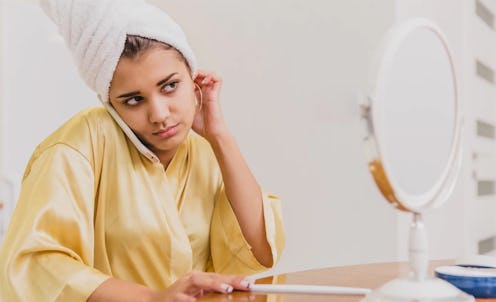
Suffering from breakouts is the absolute worst; trust me, I've been there. When I have a bad skin day, I feel at my lowest and least confident, and going anywhere without makeup on to hide my flaws just doesn't seem like an option. Whether you suffer from the occasional blemish or have regular acne, there are probably rules you may have been told you must follow for better skin. But here's the thing: there are certain skincare tips that could be making your breakouts worse. Keep reading to discover which rules to throw out, and how to best deal with breakouts in your skincare routine.
1Don't moisturise acne-prone skin
Because oil can lead to clogged pores and eventually spots, there is certain rule many acne-sufferers abide by: not moisturising skin. But I'm here to call this one out completely; in other words, it's total fake news. "I tell many of my clients who have problematic skin that it is a common misconception that skin prone to acne and breakouts should be dried out," explains skincare expert and brand founder Dr Barbara Sturm. "In fact, it is even more important to moisturise it as most breakouts are exacerbated by inflammation and dryness.” Essentially, building back the skin's healthy barrier cannot be done without effective hydration. There are many amazing lightweight formulas on the market that work well for acne-prone skin, including La Roche Posay's Effaclar Duo+ and Paula’s Choice Clear Oil-Free Moisturiser. Just don't forgo moisturising altogether.
2Use more products in your routine
It's a common misconception that when it comes to aiding stressed out skin, more is more. In fact, using lots of different products to try and help skin can often lead to overloading it, leading to more problems. "People are overdosing on too many different products without paying attention to the ingredients inside — or the interplay between those ingredients," explains Dr Sturm. "This leads to skin conditions like breakouts." Dr Sturm is an advocate of a simple, pared down routine and to take things back to basics. By sticking to a cleanse-tone-serum-moisturise routine, your skin has a chance to get used to a regimen and build back its strength. "In general, you can look for certain ingredients to target your concern," agrees Dr Howard Murad, founder of Murad skincare, "however with the right products you won’t need lots of different products."
3Go in heavy with actives and acids such as salicylic acid
A natural instinct when you see a spot is to douse it in strong ingredients that will dry it up and fix things in an instant. But as mentioned in the previous point, sticking to a simple routine to soothe skin is often best. Calming, antibacterial ingredients like rose and witch hazel are brilliant for this.
This isn't to say that AHAs (alpha hydroxy acids) and other spot-targeting acids don't have a place, however. Dr Murad explains how they can absolutely help, but just must be used mindfully and in the right way: "Initially a problem acne skin can be dehydrated, so it is essential to focus on hydration and calming by flooding the skin with antioxidants and anti-inflammatory ingredients to build the health of the skin and barrier function," he explains. "The more ‘active’ ingredients like Salicylic and Retinol are not advised without these important ingredients in place first to protect the health of the skin and get the best results from your skincare regime."
4The sun will dry up your spots
It's the old wives tale I'm sure you'll have heard from your mum at some point, but does exposing the skin to sun actually help to reduce spots? Well, while some experts agree that the rays from the sun could reduce inflammation (in a similar way to when we use blue light masks etc), it's important not to overstate the ability of the sun when it comes to acne.
In the short term, going on holiday and being in the sun may appear to reduce signs of acne, but in the long term, the sun's damaging rays can actually affect your immune system when it comes to things like fighting cancer cells. New York City dermatologist Dr. Julie Rusak explained to Teen Vogue that the sun can also "cause dehydration, which in turn stimulates oil production as your skin tries to correct the issue. That, of course, means you will end up with another breakout." Which leads nicely onto my next point...
5Avoid SPFs on your face because they can be greasy
So we've established that the sun is not a fix-all solution for acne, but does that mean we can't go out in the sun at all? Well, no, but as ever, it's so important to apply a high SPF to the face when we do. The problem is that many traditional facial SPFs can feel and look greasy on the skin, clogging pores and hence creating more blemish issues. Don't let this deter you, however; there are so many amazing modern formulations that are completely non-greasy and work to protect the skin from the sun while not bothering problem skin. This Kiehl's lotion, for example, is amazing.